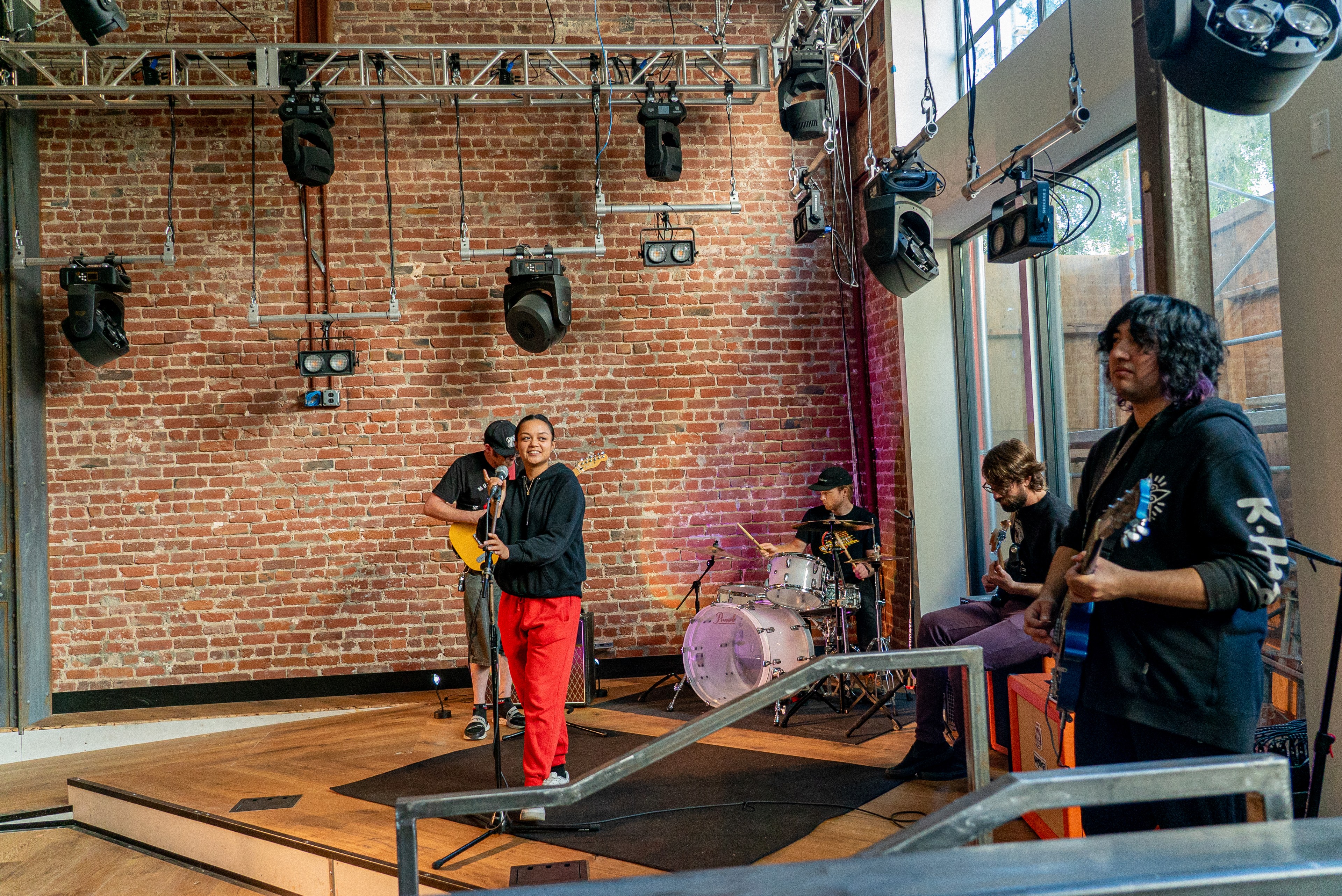Rudy Colombini, the frontman for a Rolling Stones cover band, is neither humble nor demure about his labor of love: San Francisco’s Music City, a complex dedicated to musicians and musicianship, at every level. It might sound straight out of Nashville, but it’s right here in the city’s Lower Nob Hill neighborhood.
“This is the most important fucking artistic project in the United States,” Colombini told The Standard.
The three-floor facility—which opened 20 new rehearsal spaces Friday—provides future stars with everything from living space to rehearsal rooms, engaged audiences and an array of refreshments. In the venture’s fundraising materials, Colombini is just as grandiose, describing the complex as “Motown Records, CBGB, the Chelsea Hotel, Abbey Road Studios, the Berklee School of Music, the Rock & Roll Hall of Fame, all in one building in San Francisco.”
The expansion comes at a time when San Francisco scouts for an artistic renaissance, the smoke signals of which include vinyl store openings, new music venues, expanded art spaces and entire neighborhoods enlivened by the arts.
A consummate showman who has been playing live music in San Francisco for 51 years, Colombini is used to performing. His band, The Unauthorized Rolling Stones, once opened for Elton John, and Colombini played at the Mill Valley institution Sweetwater Music Hall years ago—and also had a sold-out show there last week.
“I’ve played in every major venue,” he said. “And every shithole.”
But this gig—the passion project of his life—is the vision for which he put everything on the line, financially backing the venture thanks to the money he made as a real estate developer.
“I was born to do this,” he said. “It started out as a philanthropic project. It ended up a legacy.”
The superlative-slinging lead singer calls Music City a “star factory,” a place where emerging musicians can practice, perform and connect. There are affordable hotel and hostel rooms where touring artists can stay, store their gear and connect with a music-loving community. The bar and restaurant of the campus-like artist incubator is slated to open within 10 days, after final approval of the city’s Department of Public Health.
But the real star of the show here is the new rehearsal and venue spaces that have been under construction for the past six years, all of which are equipped with audio-visual capabilities, allowing bands to perform live online. Audience members walking into Music City can see two bands playing at once—one they hear (in the venue) and one they don’t (in the rehearsal space), beckoning passersby on Bush Street.
“There isn’t anything like this on the planet,” Colombini said. “We’ll give you a grand if you find it.”
According to Colombini, what budding musicians need most is an audience. With the number of people cycling through the complex—groups in the rehearsal spaces, guests in the hostel and hotel, the public at the bar and restaurant—there’s an organic listenership built into the building.
“There will easily be 700 to 800 people on-site,” he said.
He imagines a band rehearsing with the blinds down in the refurbished rehearsal studios—spaces that bridge the historic (original brick walls) with the modern (top-of-the-line equipment)—then streaming directly to one of the building’s venues or on a ClearChannel radio station.
Music lovers can pick up drinks from the alleyway window on Fern Street, dine in the on-site restaurant serving elevated gastropub fare and watch a multitude of bands rehearse in the stylish rehearsal spaces or take in a show at one of the four venues.
“Music is our thrill, our delight,” Colombini said. “It’s the most important antidepressant.”
It’s been a long time coming, but, to paraphase the Stones, time was on his side. The project was put on pause during the pandemic, and for a long stretch, Music City has had only one rehearsal space—a room adjacent to the hotel accommodations that had earlier been used as a common space.
The room has been continuously booked, said the hotel’s front desk receptionist, Isaac Lawrence, demonstrating the demand for more space.
Rehearsal spaces are affordable at Music City, ranging from $15 to $45 an hour, a fraction of what studios typically charge. From Jan. 5 to Jan. 12, Music City is offering its rehearsal spaces free of charge in connection with the opening celebration.
“There’s a great sense of community,” Lawrence said. “You have all these different groups commingling, between the rehearsal spaces and the guests and the permanent residents.”
Music City also houses the San Francisco Music Hall of Fame, a self-paced exhibition that spotlights local musicians who made it big.
It’s all part of a larger project by Colombini to put San Francisco back on the musical map, a city he called an “international star factory” but whose reputation has been diminished over the past 25 years.
The longtime musician cited a report put together by the London-based organization Sound Diplomacy that found many flaws in the city’s sustenance and promotion of its music scene and history. The Standard viewed a copy of the report, not made available to the public, which recommended “to create a multi-use music hub for the local community” as a priority. Colombini sees his Music City as that hub.
“I never had the big hit I wanted,” Colombini said, reflecting on his musical career. “This is my big hit.”
